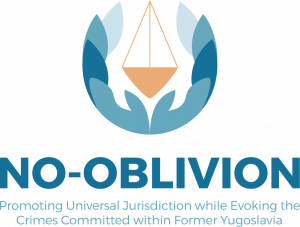Project name: NO-OBLIVION – Promoting Universal Jurisdiction while Evoking the Crimes Committed within the Former Yugoslavia
Through a victim-centred and jurisprudential lens, the NO-OBLIVION project looks back at the conflicts of the former Yugoslavia to preserve the lessons learnt in the aftermath of this war and ultimately safeguard a European legacy of respect for human rights, rule of law and peace.
It aims to share the experience lived by former Yugoslavia-affected communities and promote the developed body of law, therein furthering the shared values of respect for the rule of law, human rights, and accountability. Moreover, by bringing awareness to the legislative and legal landmarks of the Criminal Tribunal for the former Yugoslavia (ICTY), the project seeks to promote greater consciousness of International Criminal Law (ICL) and, therein promote the use of the mechanism of Universal Jurisdiction.
Funding programme
EU funded
Call: CERV-2023-CITIZENS-REM — European Remembrance



